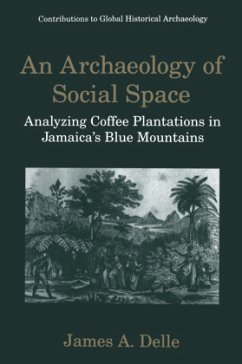James Delle has solved a number of problems in Caribbean archaeology with An Archaeology of Social Space. He deals with most of the problems by using historical archaeology, and clearly implicates Ameri canist prehistorians. Although this book is about coffee plantations in the Blue Mountains area of Jamaica, it is actually about the whole Caribbean. Just as it is about all archaeology, not only historical archaeology, it is also a book about colonialism and national inde pendence and how these two enormous events happened in the context of eighteenth and nineteenth century capitalism. The first issue raised appears to be an academic topic that has come to be known as landscape archaeology. Landscape archaeology considers the planned spaces around living places. The topic is big, comprehensive, and new within historical archaeology. Its fundamen tal insight is that in the early modern and modern worlds everything within view could be made into money. Seeing occurs in space and from 1450, or a little before, everything that could be seen could, potentially, be measured. The measuring-and the accompanying culture of record ing called a scriptural economy-became a way of controlling people in space, for a profit. Dr. Delle thus explores maps, local philosophies of settlement, town dwelling, housing, and the actual condition of plantations and their buildings now, so as to describe coffee-Jamaica from 1790-1860.
`Valuable...This theoretically sophisticated work belongs in serious anthropology, geography, plantation, and Caribbean studies collections. Upper-division undergraduates and above.' Choice (November 1998) `This volume, a reworking of Delle's doctoral dissertation, is published in the Contribution to Global Archaeology Series. In Chapter 1, Delle lays out a Marxist approach. Following James Deetz, he defines historical archaeology as the archaeology of capitalism, of the study of European colonialism. Delle reviews previous spatial analyses of colonialism, including contributions to community studies and garden, landscape, and plantation archaeology. He places his work within the latter category: a study of the negotiation of landscapes and spaces on Jamaican coffee plantations from 1790, when coffee was first produced in the Blue Mountains, until 1865, by which time coffee production in this region had ceased. Not coincidentally, during this period the British slave trade was banned and slavery abolished.' Journal of Anthropological Research `Overall, Delle's work is a well-written and interestingly conceived study in an area and industry that has received little attention. The book is beautifully illustrated with photographs, line drawings, historical lithographs, and historic maps.' Historical Archaeology, 34:2
`Valuable...This theoretically sophisticated work belongs in serious anthropology, geography, plantation, and Caribbean studies collections. Upper-division undergraduates and above.'
Choice (November 1998)
`This volume, a reworking of Delle's doctoral dissertation, is published in the Contribution to Global Archaeology Series. In Chapter 1, Delle lays out a Marxist approach. Following James Deetz, he defines historical archaeology as the archaeology of capitalism, of the study of European colonialism. Delle reviews previous spatial analyses of colonialism, including contributions to community studies and garden, landscape, and plantation archaeology. He places his work within the latter category: a study of the negotiation of landscapes and spaces on Jamaican coffee plantations from 1790, when coffee was first produced in the Blue Mountains, until 1865, by which time coffee production in this region had ceased. Not coincidentally, during this period the British slave trade was banned and slavery abolished.'
Journal of Anthropological Research
`Overall, Delle's work is a well-written and interestingly conceived study in an area and industry that has received little attention. The book is beautifully illustrated with photographs, line drawings, historical lithographs, and historic maps.'
Historical Archaeology, 34:2
Choice (November 1998)
`This volume, a reworking of Delle's doctoral dissertation, is published in the Contribution to Global Archaeology Series. In Chapter 1, Delle lays out a Marxist approach. Following James Deetz, he defines historical archaeology as the archaeology of capitalism, of the study of European colonialism. Delle reviews previous spatial analyses of colonialism, including contributions to community studies and garden, landscape, and plantation archaeology. He places his work within the latter category: a study of the negotiation of landscapes and spaces on Jamaican coffee plantations from 1790, when coffee was first produced in the Blue Mountains, until 1865, by which time coffee production in this region had ceased. Not coincidentally, during this period the British slave trade was banned and slavery abolished.'
Journal of Anthropological Research
`Overall, Delle's work is a well-written and interestingly conceived study in an area and industry that has received little attention. The book is beautifully illustrated with photographs, line drawings, historical lithographs, and historic maps.'
Historical Archaeology, 34:2








